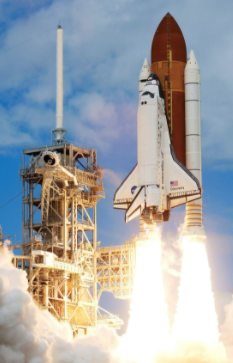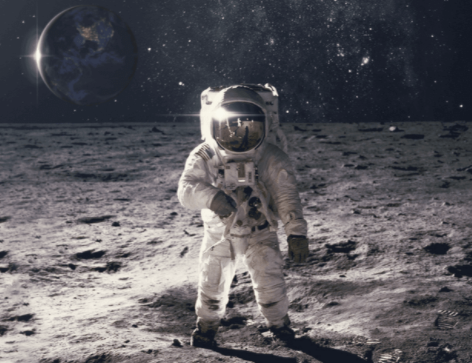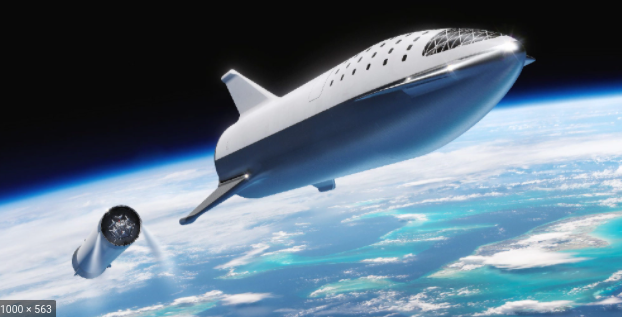Would You Want To Go To Space?
Space X, Nasa, Blue Origin, Orion Span, all major players in a new generation of travel; space travel. When stellar voyages are mentioned, people’s minds automatically flip to people like Elon Musk or Buzz Aldrin, and rightfully so. Musk founded the first major endeavor into commercial space travel and Aldrin on the first human expedition to the moon. But the thing is, a new generation of travel requires a new generation of travelers, and we can’t depend on the aging heads of industry to stick around and see. It is going to be up to a younger squadron of explorers to forge a new path into space. To see if Hauppauge students were willing to take on this mission, I interviewed 4 of my classmates to get their opinions on space travel.
 The first student to give their insight into space exploration was Mason Rivera, who’s excited to see the scientific advancement thanks to space travel. Mason is a freshman at Hauppauge High School and has been interested in space exploration for a very long time. He was specifically interested in the concept of a “moon colony,” as proposed by NASA in 2019. NASA plans to build “The Artemis Base Camp” on the moon’s southern pole in 2024. Mason thinks that this will be a very important step in seeing more space travel in the future-when us students reach adulthood- because “it can be used as a gateway to get further out to other planets.” In regards to commercial space travel, Mason says “I think it’s good that people that aren’t just the government are getting involved in this, I think it’s good that lots of people are interested in this. As for people who haven’t been really trained as astronauts getting into space I think that’s very cool, but it’s I think that’s something that needs a lot more time to develop.” Either way, Mason thinks it would be amazing to partake in space travel himself. Maybe someday, he will get to see the moon.
The first student to give their insight into space exploration was Mason Rivera, who’s excited to see the scientific advancement thanks to space travel. Mason is a freshman at Hauppauge High School and has been interested in space exploration for a very long time. He was specifically interested in the concept of a “moon colony,” as proposed by NASA in 2019. NASA plans to build “The Artemis Base Camp” on the moon’s southern pole in 2024. Mason thinks that this will be a very important step in seeing more space travel in the future-when us students reach adulthood- because “it can be used as a gateway to get further out to other planets.” In regards to commercial space travel, Mason says “I think it’s good that people that aren’t just the government are getting involved in this, I think it’s good that lots of people are interested in this. As for people who haven’t been really trained as astronauts getting into space I think that’s very cool, but it’s I think that’s something that needs a lot more time to develop.” Either way, Mason thinks it would be amazing to partake in space travel himself. Maybe someday, he will get to see the moon.
The second student interviewed, Bennet Iallonardi, brought up a noteworthy point about humanity’s captivation with deep space. When asked his opinion on space travel in general, Bennet said “As a kid I used to be interested in it, but that’s kind of ‘cause all kids were.” Bennet is, of course, completely correct in this statement: all kids, at one time or another, have been interested in space. Since the dawn of time, humanity has looked to the stars and tried to explain them. We’ve given them names, put them in groups, written them stories, and some people still believe they affect your personality. To dream about going to space is part of human nature, but actually going there is a different story. Bennet notes that “Although space travel seems cool and fun and exciting, it is very dangerous and a lot of people who work for NASA and went to space, they died on the mission. And I don’t think I’d be willing to do that.” The universe outside our little planet is full of unknown dangers, and some people don’t think finding out what they are is worth the risk: which is why Bennet Iallonardi said he would decline the offer to explore space, removing one potential astronaut from the Hauppauge trust.
 Outerspace has been a potential future for all Gen Z people; it’s on our tv shows, in our books, on the news, and even on our social media. It has always seemed like a guarantee that someday human beings will live on other planets. This is also the opinion of freshman Elliot Tafla, who stated “space travel is definitely a future that we have, but the debate is how do we do it.” There are some people who worry that government-regulated space travel will just turn international conflicts into intergalactic conflicts. There is no reason to doubt that humans would not take our political baggage with us to a foreign planet. On the other hand, many people worry that commercial space exploration is even more risky. There is plenty of corporate greed and exploitation here on earth, are we really ready to take that to space? Elliot sides more with the latter group. He feels that it is unsafe to put so much faith in CEOs and heads of industry like Elon Musk because they could very easily take advantage of commercial space travel to make a quick buck. Elliot thinks it isn’t right that Elon Musk has been made “the poster boy for Gen Z. He posts memes on Twitter so people think he’s cool.” But at the end of the day he is only trying to run his business and make a profit, the potential humanitarian benefits of space travel don’t matter to him. So, when asked if he would become an astronaut if given the opportunity, Elliot said “For the betterment of humanity, I probably would.”
Outerspace has been a potential future for all Gen Z people; it’s on our tv shows, in our books, on the news, and even on our social media. It has always seemed like a guarantee that someday human beings will live on other planets. This is also the opinion of freshman Elliot Tafla, who stated “space travel is definitely a future that we have, but the debate is how do we do it.” There are some people who worry that government-regulated space travel will just turn international conflicts into intergalactic conflicts. There is no reason to doubt that humans would not take our political baggage with us to a foreign planet. On the other hand, many people worry that commercial space exploration is even more risky. There is plenty of corporate greed and exploitation here on earth, are we really ready to take that to space? Elliot sides more with the latter group. He feels that it is unsafe to put so much faith in CEOs and heads of industry like Elon Musk because they could very easily take advantage of commercial space travel to make a quick buck. Elliot thinks it isn’t right that Elon Musk has been made “the poster boy for Gen Z. He posts memes on Twitter so people think he’s cool.” But at the end of the day he is only trying to run his business and make a profit, the potential humanitarian benefits of space travel don’t matter to him. So, when asked if he would become an astronaut if given the opportunity, Elliot said “For the betterment of humanity, I probably would.”
All of the students interviewed offered their own unique thoughts and opinions on the matter of outer space exploration, but none offered any so emotional as Amanda Williamson, junior and swim team member. Amanda was asked the same question as the boys mentioned above; “if you had the opportunity to go on a commercial space flight, would you? Why or why not?” Amanda’s response was simple, but heartfelt. She started with “It depends on if I could bring my family,” then went on to elaborate “if I was going there with my family, with my friends as a community and we really got to live as a community in space I feel like that would be a better option. So I feel like I would if I had that opportunity.” Amanda has very simply explained a missing factor in many theoretical situations about space travel. People often obsess over what we may find in the infinite blackness, but neglect what we leave behind at home. It isn’t only family we’re leaving. Earth has a rich history of civilizations, literature, art, music, and society that we have already lost much of. Would forging a new future on other planets erase the past of ours?
No matter what we dream or theorize about, commercial space travel is far from a reality, it is still a distance future. But no matter how far off our endeavors into the stars may be, the younger generation is ready to face it. Hauppauge students have considered all the variables; scientific achievement, economic prospects, political issues, and most importantly, moral values. Maybe Gen Z will never see a moon colony or find life on Mars. But maybe, just maybe, Hauppauge High School could add an astronaut to our alumni list.








